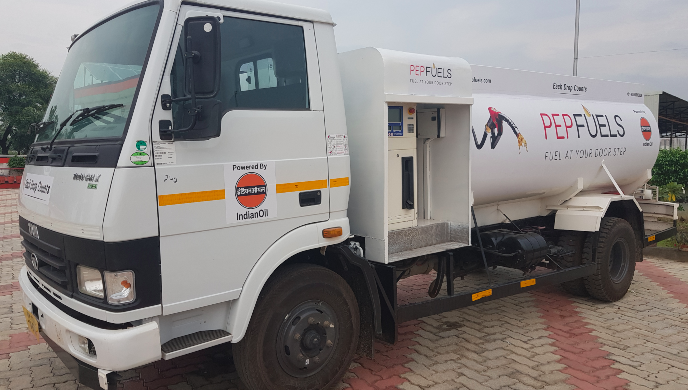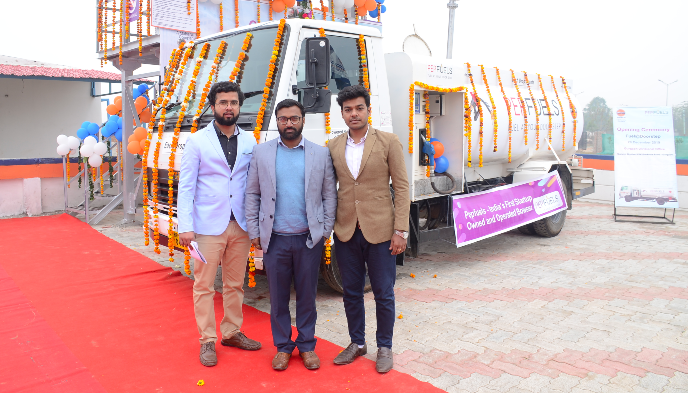
During a trip to visit his village in north India sometime in 2016, Tikendra Yadav’s two-wheeler ran out of fuel and broke down. Yadav, then an Assistant Manager at Samsung Electronics, had to walk about 10km in search of the nearest fuel station to refuel his vehicle.
When he returned to work, he thought about this incident. He wanted to put an end to this ordeal — of motorists being forced to walk or drive kilometres to refuel their vehicles — which is common in the far-flung areas of India.
Later, he discussed this problem with his former colleague Sandeep Thakur, and they created a fuel delivery startup, Pepfuels, in May 2016. The duo later on-boarded their friend Pratik Kathil.
In May 2019, Pepfuels signed a partnership with state-owned oil marketing company (OMC), Indian Oil Corporation, for doorstep delivery.
“India has over 64,000 fuel retail outlets, and over 3.5 million transactions are conducted daily at these outlets,” Co-founder Kathil tells e27.
Also Read: Why you shouldn’t let your mind dismiss your entrepreneurial dream
According to standard fire and fuel safety regulations, one can only store less than 20L of fuel in jerry cans. Saving more fuel than the restricted limit is dangerous, especially when one carries the containers in a vehicle.
“There are some businesses, industries, hospitals where fuel is required in large amounts regularly. Standing in queues during peak hours for fuel not only wastage of time but also generates a lot of pollution and traffic issues,” Kathil reveals. “Pepfuels was started to address this issue.”
Pepfuels is a location-based fuel delivery system. The startup delivers “quality fuel” to enterprises and industries at economical prices.
Customers can place their order through its app by entering the vehicle type, selecting fuel quantity, choosing a delivery slot, and entering a shipping address.
“Companies having demand less than 1,000L get fuels in drums and cans, which are transported in an unsafe manner. This method is costly and is dangerous,” warns Kathil.
For instance, industries with a demand for 5-6 kilolitres get fuels in unapproved tankers with no control on the quantity or quality. This requires additional workforce and is also unsafe. In-transit pilferage is also an issue.

Pepfuels co-founders
“We deliver fuel in the PESO (Petroleum and Explosives Safety Organisation)-approved browsers, equipped with dispensing machines which are safe. We also conduct on-site quality and quantity check,” Kathil claims.
Pepfuel’s dispensers are equipped with in-built fire extinguishers. Its vehicles are also geo-fenced and equipped with GPS and fuel sensors.
At present, Pepfuels delivers to 200-plus enterprise customers (a combined volume of 300,000-400,000L/mo), and generates revenues of INR 2-3 crore (US$270,000 to US$400,000) per month.
Its customers include Delhivery, Oyo, AVG logistics, Triumph Motor, RGL Flexible, Jaquar, and SOIL Business School.
Competition
Based in Delhi, Pepfuels is not the only fuel-delivery company operating in the country. MyPetrolPump, a Bangalore-based venture, provides doorstep delivery of diesel for generators/cars/fleet vehicles in Hyderabad, Pune, and Bangalore. BookMyPetrol is another player, which also runs a similar business in Western India.
At present, Pepfuels operates in eight cities, including Noida, Greater Noida, Ghaziabad, Manesar, Gurugram, Bilaspur, Delhi and Dadri. Expansion to 10 news cities, including Bangalore and Hyderabad, is on the cards.
“We receive 100-plus orders through our app, and our turnaround time is three to four hours,” claims Kathil.
The startup’s current delivery hours are between 8 am and 8 pm. It plans to launch 24×7 delivery soon.
IoT-RFID-based device
Pepfuels recently introduced a location-based fuel delivery system through its patented IoT-RFID (radio frequency identification)-based device to help industries, the farm sector, hotels and malls, save on fuel cost, time and prevent pilferage. It is a server-monitored reader which is connected through the dispensing machine. It is developed to provide accurate and theft-proof delivery, and to prevent fuel loss.
Also Read: 7 characteristics of a successful entrepreneur
India is a third-largest fuel-consuming market in the world. The country consumed approximately 84 million metric ton in 2018-19. As per the future projection, it will go by 160 million metric ton by 2030.
As India is an emerging county in technologies and infrastructure, and the consumption grows in a range of four to six per cent a year.
To date, Pepfuels has received angel funding of INR 4.5 crore (over US$600,000) from undisclosed investors.
“We are now looking to raise pre-Series A round to expand into the B2C segment this year,” Kathil concludes.
The post Pepfuels’s IoT-RFID device ensures smart delivery of motor fuels at customers’ doorsteps in India appeared first on e27.